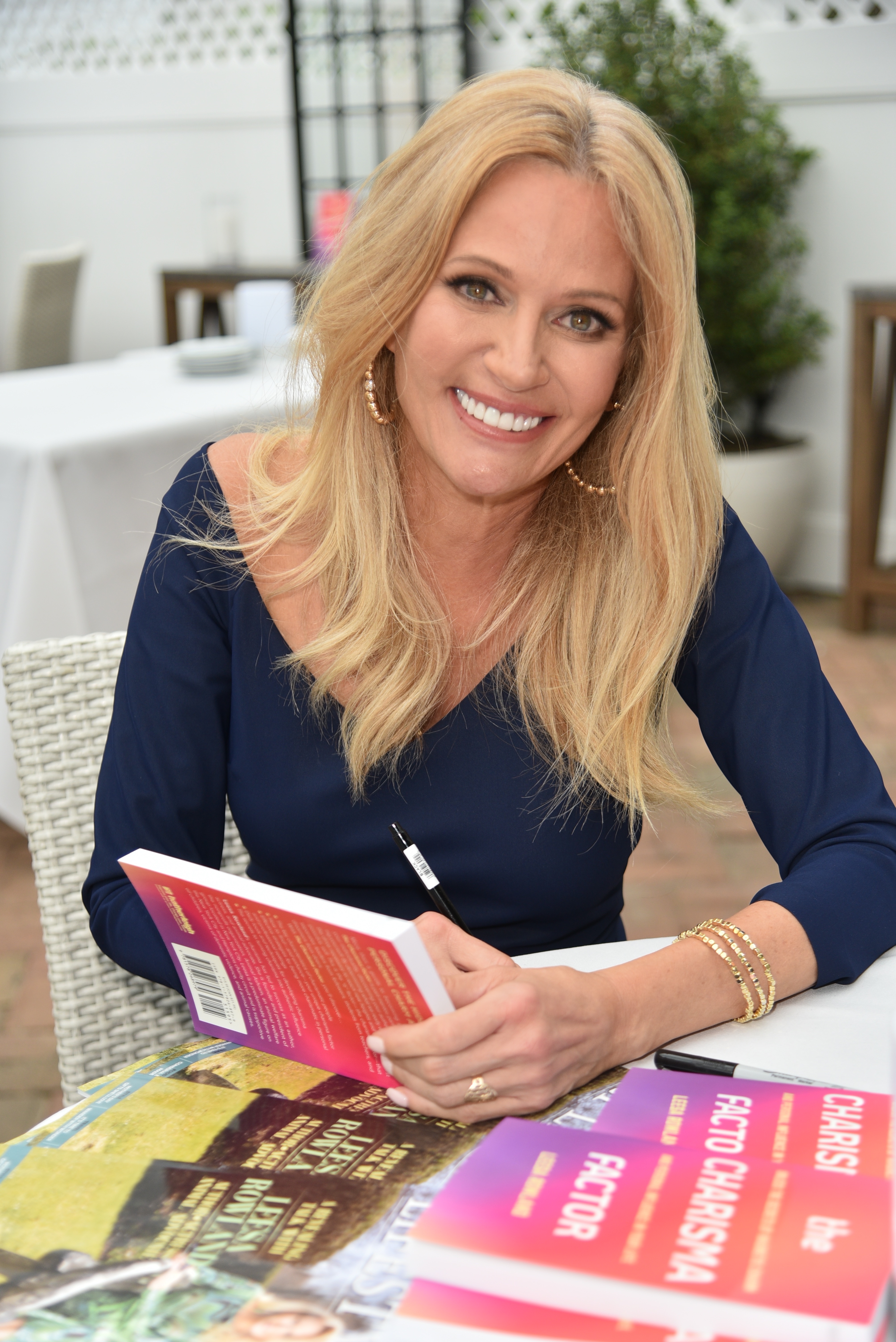How to Strengthen Your Innate Charisma
By Tara dos SantosCharisma—that magical spark found in many powerful leaders throughout history—isn’t only a rare natural gift, says actress and author Leesa Rowland. “Everybody has charisma,” she says. “Everybody. It’s just a matter of looking inside.” Rowland teaches people to find that little spark within and stoke it into a blaze. In acting school, she learned how to have a commanding presence and how to portray charismatic people onstage. These lessons gave her the first indication that charisma is something that can be cultivated with the right training. She later delved into the spiritual and scientific perspectives on charisma. The word’s origin is in ancient Greek, and its definition to this day includes a “divinely bestowed gift.” Rowland’s spiritual journey has made her realize that beauty within shines outwardly, making one more charismatic. She has also learned, from the studies of sociologists and political scientists, the characteristics of charismatic people and how they influence others. British psychologist Richard Wiseman has studied charismatic people. His conclusion is that they feel emotion strongly and induce similar emotions in others. For example, he says a charismatic person speaking to a large audience will often move around on stage, showing enthusiasm, and that enthusiasm is infectious. He sees charisma as partly innate, partly learned; developing communication skills is key. Rowland’s book “The Charisma Factor” (2021) mines wisdom on the topic past and present, and includes her own learned experience. (Courtesy of Leesa Rowland) Anyone Can Be Charismatic “It doesn’t mean that you have to be a politician or a famous actor,” Rowland tells Radiant Life. “You could be a waitress and be super-psyched about what you’re doing, and making the best of everything you do, and have a lot of charisma.” A few of the main ingredients for charisma, Rowland says, are making use of your natural talents, being passionate about what you’re doing, building self-confidence and self-love, and being kind. A good place to start, she says, is making a list of what you like and what you’re good at. See how much of that you have in your life already and whether you can spend more time doing those things that make you shine. “The thing with charisma is you really have to go inside and find what’s unique about yourself,” Rowland says. “You really have to love yourself. If you don’t love yourself, you’re not going to present yourself well to others.” Appreciating what makes you unique and what your strengths are can also help with self-confidence. While suggesting some bigger mental and emotional changes to build charisma, Rowland also gives tips for effective communication and body language. As an actress, she was taught to take up more space on the stage. “Once you start opening up and you utilize your space, you become more charismatic,” she says. “It’s what you’re taught [in acting]. But the thing is, people aren’t taught that in day-to-day life.” In her book, she gives an example of how the right words and actions can impact others. “When we see someone performing an action, like punching the air in triumph, there are parts of our brain that almost copy those same actions,” she writes. Though we may not actually pump our fists as well, some parts of our brain involved in that action—and the emotions that go with it—will fire; this is the ability to evoke empathy with body language, and the ability to inspire similar emotions and actions in others, says Rowland. This power of influence is part of charisma. Clear, bold speech is charismatic, she says. One technique that helps achieve this is contrast. She quotes John F. Kennedy as an example of effective contrast: “Ask not what your country can do for you, but what you can do for your country.” Reducing the world’s complexities to a simple binary statement makes the choice clearer, Rowland says. Eye contact and listening well are important. Rowland gives the example of former U.S. President Bill Clinton; as an actress, she has had a chance to meet highly charismatic people, including Clinton. “He has a way of making you feel like you’re the only person in the room. He never darts his eyes behind you or anything. He just keeps his focus right on you,” she says. Former President Donald Trump is also charismatic, she says, and “uses smiles as his weapons, and timely pauses.” The source and manifestation of charisma is different for each individual. Rowland lists other examples: “If you look at Elon Musk, I would say his enthusiasm is his superpower. If you look at [former Secretary of State] Mike Pompeo, he’s very charismatic, but his intelligence is his superpower and charisma.” An especially strong charisma shines forth when one cultivates virtues, such as sincerity and compassion, Rowland says. “True charisma is actually about projecting your best self.” Spiritual Growth When Rowland was 16, following her grandfather’s death, she star

By Tara dos Santos
Charisma—that magical spark found in many powerful leaders throughout history—isn’t only a rare natural gift, says actress and author Leesa Rowland. “Everybody has charisma,” she says. “Everybody. It’s just a matter of looking inside.” Rowland teaches people to find that little spark within and stoke it into a blaze.
In acting school, she learned how to have a commanding presence and how to portray charismatic people onstage. These lessons gave her the first indication that charisma is something that can be cultivated with the right training. She later delved into the spiritual and scientific perspectives on charisma.
The word’s origin is in ancient Greek, and its definition to this day includes a “divinely bestowed gift.” Rowland’s spiritual journey has made her realize that beauty within shines outwardly, making one more charismatic. She has also learned, from the studies of sociologists and political scientists, the characteristics of charismatic people and how they influence others.
British psychologist Richard Wiseman has studied charismatic people. His conclusion is that they feel emotion strongly and induce similar emotions in others. For example, he says a charismatic person speaking to a large audience will often move around on stage, showing enthusiasm, and that enthusiasm is infectious. He sees charisma as partly innate, partly learned; developing communication skills is key.
Rowland’s book “The Charisma Factor” (2021) mines wisdom on the topic past and present, and includes her own learned experience.

Anyone Can Be Charismatic
“It doesn’t mean that you have to be a politician or a famous actor,” Rowland tells Radiant Life. “You could be a waitress and be super-psyched about what you’re doing, and making the best of everything you do, and have a lot of charisma.”
A few of the main ingredients for charisma, Rowland says, are making use of your natural talents, being passionate about what you’re doing, building self-confidence and self-love, and being kind.
A good place to start, she says, is making a list of what you like and what you’re good at. See how much of that you have in your life already and whether you can spend more time doing those things that make you shine.
“The thing with charisma is you really have to go inside and find what’s unique about yourself,” Rowland says. “You really have to love yourself. If you don’t love yourself, you’re not going to present yourself well to others.” Appreciating what makes you unique and what your strengths are can also help with self-confidence.
While suggesting some bigger mental and emotional changes to build charisma, Rowland also gives tips for effective communication and body language.
As an actress, she was taught to take up more space on the stage. “Once you start opening up and you utilize your space, you become more charismatic,” she says. “It’s what you’re taught [in acting]. But the thing is, people aren’t taught that in day-to-day life.”
In her book, she gives an example of how the right words and actions can impact others. “When we see someone performing an action, like punching the air in triumph, there are parts of our brain that almost copy those same actions,” she writes. Though we may not actually pump our fists as well, some parts of our brain involved in that action—and the emotions that go with it—will fire; this is the ability to evoke empathy with body language, and the ability to inspire similar emotions and actions in others, says Rowland. This power of influence is part of charisma.
Clear, bold speech is charismatic, she says. One technique that helps achieve this is contrast. She quotes John F. Kennedy as an example of effective contrast: “Ask not what your country can do for you, but what you can do for your country.” Reducing the world’s complexities to a simple binary statement makes the choice clearer, Rowland says.
Eye contact and listening well are important. Rowland gives the example of former U.S. President Bill Clinton; as an actress, she has had a chance to meet highly charismatic people, including Clinton. “He has a way of making you feel like you’re the only person in the room. He never darts his eyes behind you or anything. He just keeps his focus right on you,” she says. Former President Donald Trump is also charismatic, she says, and “uses smiles as his weapons, and timely pauses.”
The source and manifestation of charisma is different for each individual. Rowland lists other examples: “If you look at Elon Musk, I would say his enthusiasm is his superpower. If you look at [former Secretary of State] Mike Pompeo, he’s very charismatic, but his intelligence is his superpower and charisma.”
An especially strong charisma shines forth when one cultivates virtues, such as sincerity and compassion, Rowland says. “True charisma is actually about projecting your best self.”
Spiritual Growth
When Rowland was 16, following her grandfather’s death, she started seeking spiritual wisdom. Rowland faced many challenges in her youth; she was adopted, and had “abandonment issues,” she says. Her adoptive parents were loving, but they went through a messy divorce that was hard on her. Her mother remarried; then, her stepfather poisoned her mother to death. Her mother’s death was “one of the deepest, saddest, sharpest, most helpless pains I have ever experienced,” Rowland writes in the book.
As an adult, some people claiming to be her biological family played on her emotions and swindled her out of heirlooms that had much financial as well as emotional value. They offered to hold them for her while she moved across the country, but she never got them back.
“A victim mentality is very low charismatically, and it doesn’t get you very far,” Rowland tells Radiant Life. “I think it’s very important to think of yourself as a warrior. I think of myself as a charismatic warrior and I’m going to transmute everything negative that comes into my life into positive.”
She went through a “dark night of the soul,” she says, in which she looked at all the things that trigger her. She traced those back to events in her life, especially in her childhood. “You see it with compassion and love, and you’ve forgiven everybody who has done anything wrong to you because they were wounded and that’s what made them do these things.”
When she cultivates her inner light, she feels that it shines forth as charisma.
In her book, she writes: “The charisma factor is an amalgamation of your inherent talent, the passion with which you were born, and the natural forces that, when aligned, ignite your energy potential and soul. The most common mistake most people make is to look for their charisma in the outer world, ignoring the truth that what they are searching for lies within.”
This article was originally featured in Radiant Life Magazine.












